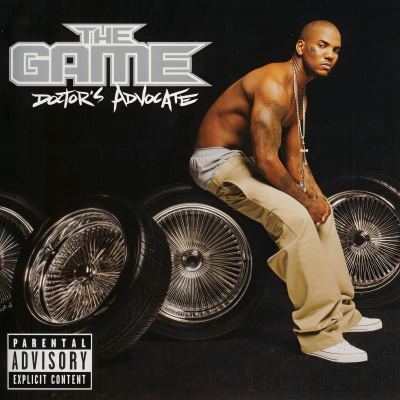
Doctor's Advocate
by David JeffriesWhile his big rival and former employer, 50 Cent, squandered his success by spreading himself too thin with video games, films, and a whole lot of time devoted to the G-Unit empire, the Game spent his time working the streets with beef-minded, sometimes-epic freestyles landing on mixtapes. Every time the G-Unit versus Game beef was just about to be settled, the Game showed up late to sign the treaty, and then, when he was called out on it, he would retaliate as hard as before, bringing everything back to square one. His mentor, Dr. Dre, told him to lie low, but give the Game good advice and he'll do the opposite, as if he were compelled to do so by some unseen force (probably his mile-high ego). As the release date of his heavily anticipated Doctor's Advocate approached, things got weird. Because of the G-Unit contract, nobody was sure if the album would say Aftermath or Insterscope on the back. In the final moments, it was revealed that the cover art shamelessly references his debut, and then -- towering above it all -- there was Dre's absence from the final product, and yet the album's original, Dre-boasting title sticks like a final "screw you"/"bring it on" pointed right at the haters. As all this drama spills into the actual album and feeds the cocksure rapper's craving for chaos, it becomes obvious the "sophomore slump" wasn't enough of a challenge for the Game, and even more obvious that he's following a career path of his own. Just like The Documentary, Doctor's Advocate is obsessed with the West Coast, especially Dre. The Doctor's name is dropped incessantly, to the point it will drive haters and anyone unfamiliar with the Game's history crazy. The ghost of Dre is there in every instantly grabbing club-banger and fierce street track that arcs up to the key title track, where the Game lays it all on the table with an open letter to the producer. He uses words like "family" and "father" to pay tribute to their relationship before Aftermath and Dre associate Busta Rhymes is brought in as a guest just to amp up the desperation question. On paper, Doctor's Advocate sounds like the blueprint for the most desperate follow-up ever, with the Game treating the universe as his fanboy while constantly referencing people who aren't here and an era of which he's not a part, the golden age of the West Coast. On the crip-walkin' "Da S***" there's talk of bringing back Doggystyle and The Chronic; on "California Vacation," with Snoop by his side, he claims to be previewing Dre's so-far unreleased Detox album; and "Compton"'s old-school bounce is firmly 1993 and produced by will.i.am, who returns to his hood sound after years with the polished Black Eyed Peas. will's transformation back is just one of the magical things that happens around and in spite of the Game's flippant attitude and decidedly one-track mind. Other beat-makers like Kanye West, Just Blaze, Scott Storch, and Swizz Beatz are all on fire, and guests like Tha Dogg Pound, Nas, and Xzibit give their all to an album that doesn't even bother to mention them on the back cover. Course, toying with expectations and respect is the dangerous tightrope the Game walks brilliantly, and while this is nothing new, the fact remains that every track here is as good as or better than those on his debut. There's no precedent for an album that worships a no-show so hard on one hand, flips the bird to hip-hop protocol with the other, and knowingly refuses to push things forward, even flaunts it. What's fascinating is how the Game sets up all these obstacles for himself, just to prove he's unstoppable, and offers a decided placeholder album when most would have gone a different route. The place he's holding is on top, and even without Dre, Doctor's Advocate suggests he shouldn't budge.
